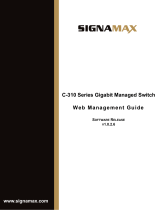
18 Dell PowerConnect 55xx Systems User Guide
Static MAC Entries
MAC entries can be manually entered in the Bridging Table, as an alternative
to learning them from incoming frames. These user-defined entries are not
subject to aging, and are preserved across resets and reboots.
For more information, see "Static Addresses" on page 418.
Self-Learning MAC Addresses
The device enables controlled MAC address learning from incoming packets.
The MAC addresses are stored in the Bridging Table.
For more information, see "Dynamic Addresses" on page 421.
Automatic Aging for MAC Addresses
MAC addresses from which no traffic is received for a given period, are aged
out. This prevents the Bridging Table from overflowing.
For more information, see "Dynamic Addresses" on page 421.
VLAN-Aware MAC-Based Switching
The device always performs VLAN-aware bridging. Classic bridging
(IEEE802.1D), in which frames are forwarded based only on their destination
MAC address, is not performed. However, a similar functionality can be
configured for untagged frames. Frames addressed to a destination MAC
address that is not associated with any port are flooded to all ports of the
relevant VLAN.
MAC Multicast Support
Multicast service is a limited Broadcast service that enables one-to-many and
many-to-many connections for information distribution. In Layer 2 Multicast
service, a single frame is addressed to a specific Multicast address, from which
copies of the frame are transmitted to the relevant ports. When Multicast
groups are statically enabled, you can set the destination port of registered
groups, as well as define the behavior of unregistered Multicast frames.
For more information, see "Multicast" on page 508.




















